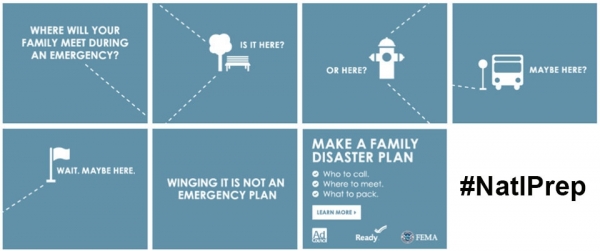
It is National Preparedness Month in the United States. The idea behind the federal designation is that Americans will prepare for natural disasters. As of 2009 according to FEMA, only 57% of Americans are prepared with supplies in their home and only 44% of Americans have an emergency plan.
While I wholeheartedly agree that we should be prepared for a natural disaster, I also believe that you should be prepared for an emergency while in your vehicle. As a lifelong Michigan resident I know that being unprepared for a vehicle emergency can make it, if not more dangerous, at least more inconvenient. These are several of my recommendations for items to be kept in your vehicle.
Specifically, for the winter months:
- Boots and gloves – This I know from personal experience. US 131 southbound on New Year’s Eve and a young woman driving too fast for the conditions who decided my beloved Nissan Maxima would look better on its side in the center median. I had on high heels that looked fantastic but were not good footwear for standing on the side of the road for two hours. I had boots in the trunk. What was already a stressful situation could have been miserable without boots
- A can with a candle in it and matches or a lighter. If you’re stuck in very cold weather with a non-running vehicle, this can help you stay warm.
- Flares or orange reflector triangle.
- Water and snacks.
- Ice scraper, small tools and a small shovel with a bag of sand or kitty litter. If you can get yourself unstuck and not have to wait for a tow truck, all the better.
Items you should always have in your vehicle:
- A blanket and first aid supplies
- A flashlight – Check the batteries every season to make sure it stills works.
- A car charger – Beside the fact that you need your phone to call for help, if you have to sit for a while, you may have to let everyone on Facebook know and then post pictures.
- Jumper cables – Make sure you know how to jump start your specific vehicle. There are different methods for particular vehicles and doing it incorrectly can possibly cause electrical damage.
- Gasoline - One interesting thing I’ve read on many sites is that you should never let your gas gauge drop below a half tank. From a technical standpoint, keeping your fuel tank away from the lowest level also helps protect your fuel pump. In the case of a natural disaster, you won’t be someone scrambling to find gas for your car.
If you are interested in creating a vehicle safety kit, check out our Pinterest boards for Arie Nol Auto Center. There are some terrific ideas and great lists. Or, Happy National Preparedness Month!